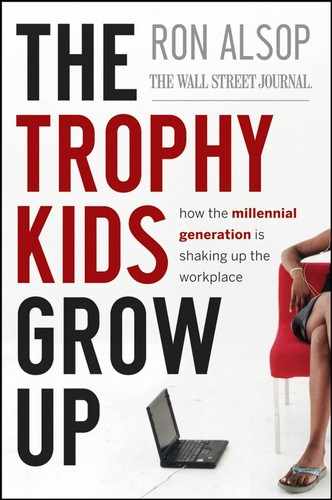8.5. ARE WE HAVING FUN YET?
Millennials just want to have fun—at work. That may sound like heresy to managers, but this generation detests nothing as much as drudgery and boredom. "They look at the workplace as a social organization, not just a job," one corporate recruiter told me.
Although "fun" may be not be in the vocabulary of most employers, some firms are adding a bit of frivolity to the workday to keep millennials happy. Just as it provides employees lots of services for taking care of personal chores, Google also has earned a reputation for its playful workplace atmosphere, from the baby grand piano to pool tables and big exercise balls to roller hockey in the parking lot.
Not many companies can compete with Google's allure, but the Seattle law firm Perkins Coie is proud of its "happiness committee." The committee surprises lawyers and their staffs with bags of candy, milk shakes, and other treats. In some offices, employees get flowers on their desks on May Day, while others celebrate Chinese New Year and Mardi Gras.
In a similar vein, Deloitte has created what it calls the Office of Surprise. There isn't really a physical office, but the firm has started coming up with entertaining programs and such unexpected perks as four extra days off in the summer. One of its first projects was the "What's Your Deloitte?" Film Festival. Given the explosive growth of YouTube and video creation on cell phones and handheld cameras, Deloitte feels that encouraging self-expression through film and other media is now essential in recruiting and retaining millennials. For the competition, Deloitte provided video cameras to employees, who ended up sharing their impressions of the firm in more than 370 films. The winning videos were posted on YouTube.
Some companies are helping young employees find opportunities to socialize together both at work and after hours. Such activities build camaraderie as employees get better acquainted with each other and learn about common interests. Google offers ski trips, company movie days, summer picnics, and Halloween and holiday parties. At Ogilvy Public Relations Worldwide in New York City, the Take 5 Action Committee was formed to plan social activities, such as the holiday karaoke party, the build your own sundae bar, impromptu happy hours, and "name the caption" photo contests. "The millennial generation has a lot of expectations about getting promoted every year," says Kate Cronin, managing director of Ogilvy's New York office. "We're trying to create a collegial, enjoyable atmosphere, so they will still want to come to work even if they aren't promoted every year."
Harris Corp., a communications and information technology company in Melbourne, Florida, has developed a formal Graduate Acclimation and Development Program (GRAD) for new hires to help them make the transition from college to the workplace. Some young employees had taken to calling Melbourne "Melboring" because of the large number of retirees. GRAD's goal is to lure more millennials by providing social activities, such as kayaking, ice skating, and paintball, and community service projects, such as beach cleanups and Habitat for Humanity house-building projects.
Because some employees take smoking breaks outside, millennials also have petitioned Harris to give them "play breaks" by installing foosball and Ping-Pong tables. Cindy Kane, director of corporate relations at Harris, would be more than happy to oblige. "Because there's going to be a talent shortage, we need to be more flexible and adaptable to the millennial generation and its needs," she says. "This generation is going to rule the roost before long."
CHAPTER HIGHLIGHTS
|
